Emi and Afaq Mahmoud
Narrative written by Ann de Forest
Photos by Dave Tavani
“It’s terrifying to think that the places you’re from are being erased,” says Emi, as she and her sister consider the notion of home. Is home defined by the mementos preserved in their father’s suitcase? Is home their own hazy memories of Sudan? Or is it the Philadelphia house their parents and brothers and baby sister happen to reside in at this moment?
Emi and Afaq Mahmoud’s father keeps a beat up suitcase under the bed of their family home in Northeast Philadelphia. He pulls it out sometimes and opens it, sorting through the contents – photographs mostly, of his wedding and his relatives back in Sudan, and keys to all the houses he and his family have ever lived. It was the suitcase he used when he went to medical school, in Serbia, years ago. It has accompanied him on all his moves since, from Sudan to Yemen, then to the U.S., first Alexandria, Virginia, then Fort Wayne, Indiana, and finally Philadelphia, where he and his family have lived since 2001. His oldest daughters, part of this journey too, understand why the suitcase is important to their father, but the periodic ritual of perusing its contents remains mysterious. “My dad takes things out and puts them back. I’m confused about the process,” says Afaq, age 20.
“What we know of the story of our journey has been told to us, because we were very young,” Emi, 23 leans forward at the edge of a chair in her family living room. Bright orange and purple shades cover a wide window, casting the living room in a warm, colorful glow. Their four-month old baby sister, sways, contentedly alert, in an automated swing beside her, as Emi and her sister take turns telling their family’s story, patched together from what they’ve heard and what they remember.
Emi was born in Khartoum, Sudan, but left when she was still a baby. Afaq was born in Sana’a, Yemen, where her parents fled. Their father is a doctor, and had worked for the government in Khartoum, at the same hospital where their mother was a medical technician. Earlier, he had been sent to Darfur to assist in a hospital there. He learned of atrocities being committed, mass graves and executions. When he reported his horrifying findings to his superiors back in Khartoum, they asked him to stay silent and offered him a promotion. He turned it down, knowing it was no longer safe for him and his family to stay in Sudan.
Their time in Yemen is a blur of impressionistic memories, not clearly rooted in a specific time or place. There was the time Afaq tossed her sister’s shoe out the high window of their apartment in Sana’a, an earlier time when Emi watched her pregnant mother getting an ultrasound, and cried out, sure the doctor was trying to hurt her. The sisters recall together another day, in that Yemen apartment, hearing loud pops and bangs they didn’t know yet to call gunfire. Their mother yelled at them to duck. “I’m more scared of her yelling than what was happening outside,” says Afaq.
And then, “there was this crazy day,” Emi recalls. She was 4 and her sister just 2 ½. “We had to pack everything that we had. All the money, all the gold, we had to give it away.” Their mother had won the Green Card Lottery sponsored by the U.S. Immigration Service. They were moving to the United States. “I do remember being on a plane with no seats,” says Afaq, as if she’s recounting a half-remembered dream. “Then again it was probably a train.”
“It was a closed vehicle. A lorry,” insists Emi.
The family was sent to Alexandria, a city with a small but established Sudanese community. Fort Wayne and Philadelphia, where they subsequently moved, were also cities where Sudanese had relocated.
A sense of insecurity followed them, even to America. “In every country we’ve ever lived in, our mother told us to hide or go under the bed,” says Afaq. The day of the 9/11 attacks, the family had just relocated to Philadelphia. Emi and Afaq came home from their new school, and their mother locked the door and shooed them under the bed. “My Mom said, ‘They’re going to come after us,’” Afaq recalls. “They’re going to round up all the Muslims and kick us out of the country’”.
Their most terrifying memory of hiding happened when their mother wasn’t around. No adults were. In 2000, their mother took the girls back to live with her own family for a year in Darfur. The girls were six and four. They lived in a compound with their uncles and cousins, enclosed by a wall. The wall seemed high to the children, but was low enough that an adult could peer over into the courtyard. Afaq remembers placing her stuffed tiger on top of that wall as a guard. Their cousins, boys, just a little bit older, loved playing war. They boasted about their dads driving tanks, and turned sticks and anything else they picked up off the ground into guns. Afaq didn’t like this, she remembers. “There were real shells on the ground.”
The adults had gone for the day, marching into town to confront some real tanks, their cousin said. Emi remembers seeing her mother and her uncles huddled around the dinner table the night before. “They were planning something.”
Playing pretend soldier in the streets, her cousin picked up one of the shells and pointed it at Afaq. “He said, ’I’m going to use this to shoot you.’ And that’s when the real soldiers came,” she says.
The children fled into the house and locked the door. Then two girls, teenagers in school uniforms, banged on their gate. They needed to hide, the girls said. The children let them in. “They told us to hide, and they told us where,” says Emi.
The soldiers barged in and searched the house. Emi and Afaq and their cousins, huddled together, watched from under the bed. The two girls were together under an opposite bed. “We saw the soldiers walking by in the bedroom,” says Emi. “It was awful. I only remember bits and pieces.” They lay still and quiet. The soldiers passed through, then left the house and the compound. They never looked under the beds.
That evening, their mother and uncles returned. Their uncles were covered in blood, and Afaq was sure they were badly wounded. But the blood that covered their clothes belonged to the dead and wounded men they had carried back to the house. “We thought of our uncles as grown adults,” says Emi. Now that she looks back, she realizes they were just teenagers, younger than she and Afaq are now.
Not long after, the girls and their mother returned to America. While they were gone, their father had moved from Indiana to Philadelphia, where the family has stayed ever since. “I have no idea why our parents came here,” says Afaq. “But I’m not complaining.” Adds Emi, “This is my favorite of all the Sudanese communities. We have more than 100 families.” Philadelphia is also where the family grew, from two children to six: “All our adorable little brothers and this monster over here,“ says Emi, with a wave at her baby sister.
Growing up in Philadelphia brought different difficulties. They recount the harassments of middle school – classmates sniffing their lunch and making faces, mocking them for eating rice. Even now, even their friends can make thoughtless remarks, calling them Lupita (after Kenyan actress Lupita Nyong’o), for example, and thinking it’s a compliment.
When Emi went to Yale University, after graduating from Philadelphia’s Masterman High School, one of the top public high schools in the country, she bristled when new friends eagerly asked her to recount, again and again, her family’s traumas, the escape from Sudan, the soldiers in Darfur. Curiosity, even empathy, when unasked for, felt like a violation. “Something that’s detrimental is voyeurism. It’s disrespectful. It’s reductive,” she says, adding that she has the right to tell her stories on her own terms. “Telling them takes a lot out of me.” Her biggest fear at Yale was “being somebody else’s ‘experience.’ I’m terrified of that. You don’t want to be somebody’s ‘experience.’”
Afaq, who graduated from Central High School, another of Philadelphia’s competitive magnet schools considered one of the country’s most diverse, found her time at college more unsettling. She spent a year at the University of Arizona, drawn to the desert setting, and the promise of warm climate and open spaces. Tuscon was beautiful, she says, but “Arizona was hell. Every time I felt like I was putting my roots down, I was reminded I didn’t belong there. It’s hard to always be told to go back to where you came from. You can’t put roots down in the place where the soil won’t have you.”
For both sisters, spoken word poetry became a means to explore and express the layered, contradictory, and at times dissonant experiences of culture, identity, and home. In October 2015, Emi won the Individual World Poetry Slam Championship. Her powerful winning poem “Mama” ends with these lines:
And you don’t know compromise until you’ve rebuilt your home for the third time
Without bricks, without mortar, without any other option
I turned to the man and said,
My mother and I can’t walk the streets alone back home any more.
Back home, there are no streets to walk any more.
“It’s terrifying to think that the places you’re from are being erased,” says Emi, as she and her sister consider the notion of home. Is home defined by the mementos preserved in their father’s suitcase? Is home their own hazy memories of Sudan? Or is it the Philadelphia house their parents and brothers and baby sister happen to reside in at this moment? The family moved to that house while Afaq was away in Arizona. And though some of their furniture – a glass-fronted china cabinet and the dishes inside – have been fixtures in every house they’ve lived in, their mother is always changing the décor and rearranging the layout of the furniture. The rug, the coffee table, those vivid window shades that infuse the room with color and warmth are all recent additions. Neither sister, knowing their mother’s whims, expects the current set-up to be permanent.
Emi has a different definition. “It’s complicated. Wherever you are the things around you have changed. I used to think it was the people you were around… It can’t be just the people. They go away too. Is it a feeling? I don’t know.”
For Emi, home is tied to identity, not the identity that others impose, an expectation against which she is judged or measured. She talks about how in Sudan, she’s seen as too American, in America, too Sudanese. At college, friends questioned why she covered her head, saying, “You’re smart, how can you be religious?” Embracing these disjunctions and contradictions has become a source of empowerment that has led Emi to define home as being comfortable with who she is, at any given moment. “It’s this feeling of being exactly who you are – and all of who you are. That freedom to choose who you are in this moment and not by people who are always trying to define who you are, to say ‘I’m Emi,” and not having to give any other explanation.”
Sitting in their mother’s house just two weeks after the presidential election, they agree, that finding that sense of home in the era of Trump (“the baked Cheeto,” Afaq calls him) is a challenge. “Now I don’t know what the future looks like,” says Afaq. “I feel like for a lot of people they don’t see me as part of that future or want to make me feel that way.”
That challenge, both sisters agree, comes with an imperative. No matter what careers they eventually pursue– Emi is drawn to medicine, Afaq to working with children, and both plan to always keep writing – they feel they have a different responsibility than their parents’ generation. They are in awe of their parents’ courage “The biggest act of defiance my parents did is existing and let us exist,” says Emi with pride.
For Emi and Afaq, hiding under beds is not an option. They are compelled to speak out and be outspoken, to spark conversation with others who have shared the same struggles.
“Growing up, I thought all the struggles that I had I felt were unique to me,” says Afaq. “I want to normalize our identities more so we don’t feel like these weird unicorns left out in the cold. We are part of the majority culture. –and we understand the American identity. Many people don’t make an effort to understand us or people other than them. I want to change the way we talk about people, change the way we talk to each other.”
“Right now it’s urgent,” says Emi, “to say we’re still fighting and say we’re still here.”

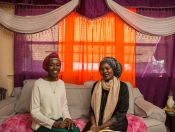
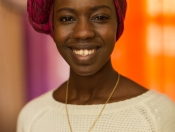
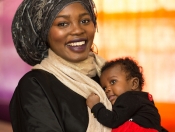
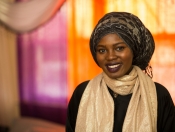
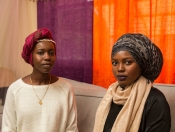
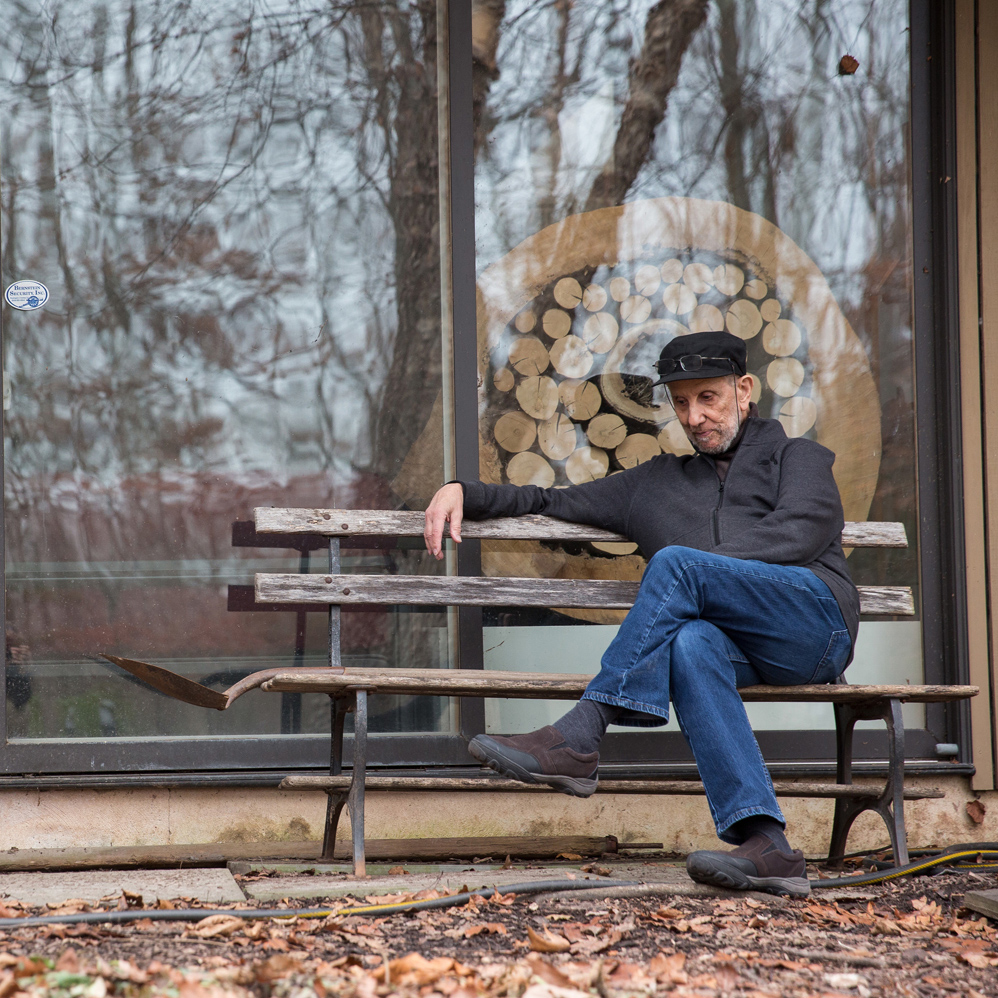 Rajie Cook
Rajie Cook 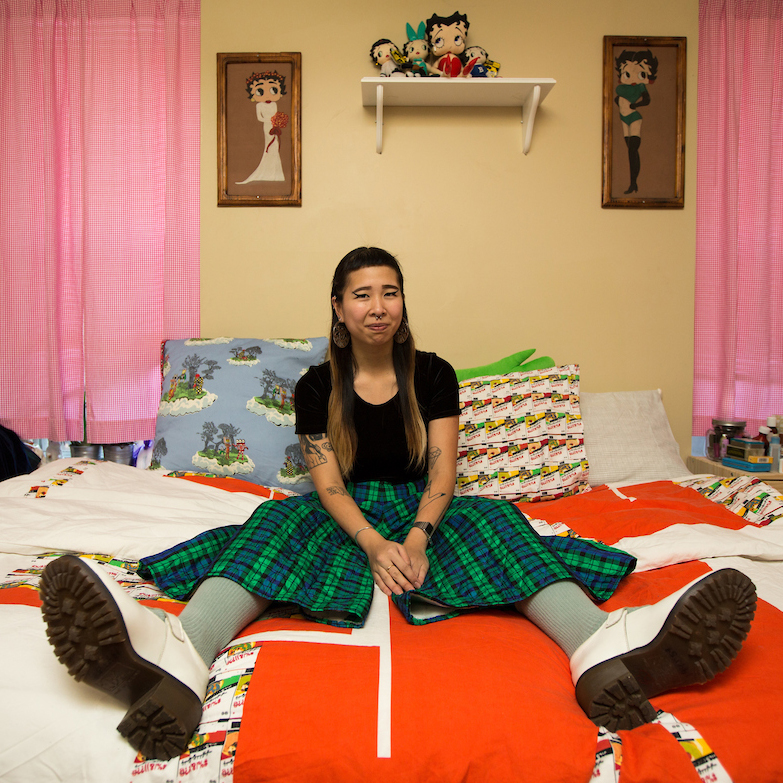 Cocoa Mahoney
Cocoa Mahoney 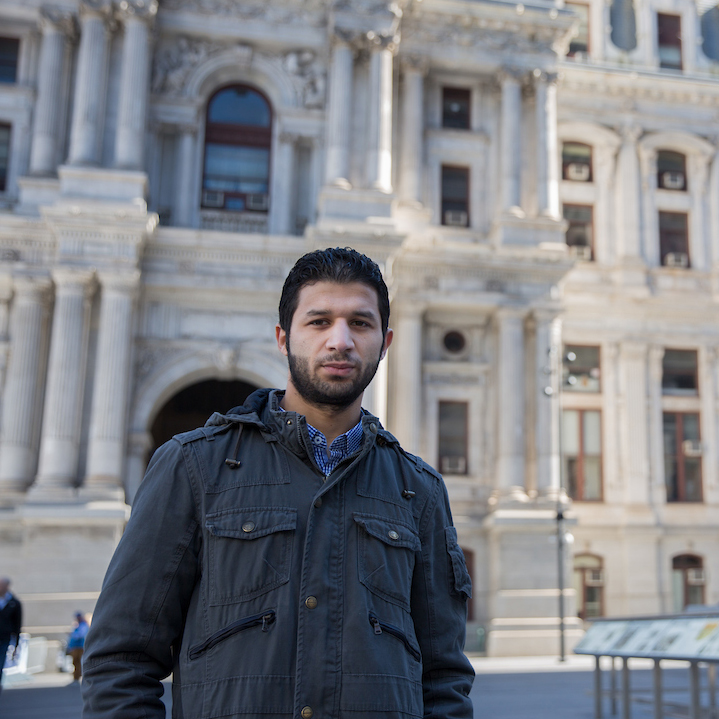 Yasser Allaham
Yasser Allaham 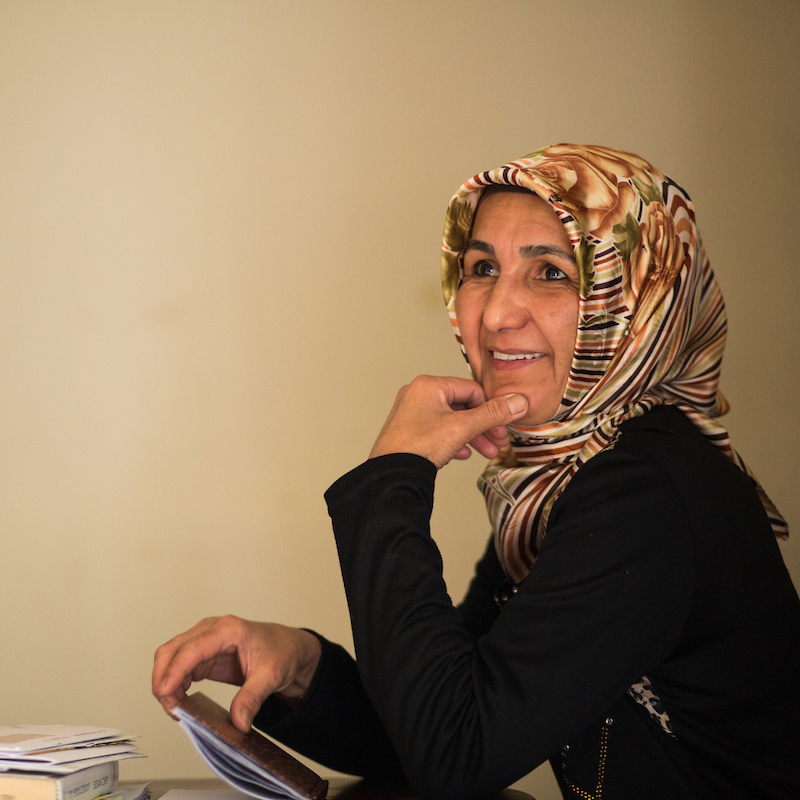 Gulnora Ravshan
Gulnora Ravshan  “Floating Outsider”
“Floating Outsider” 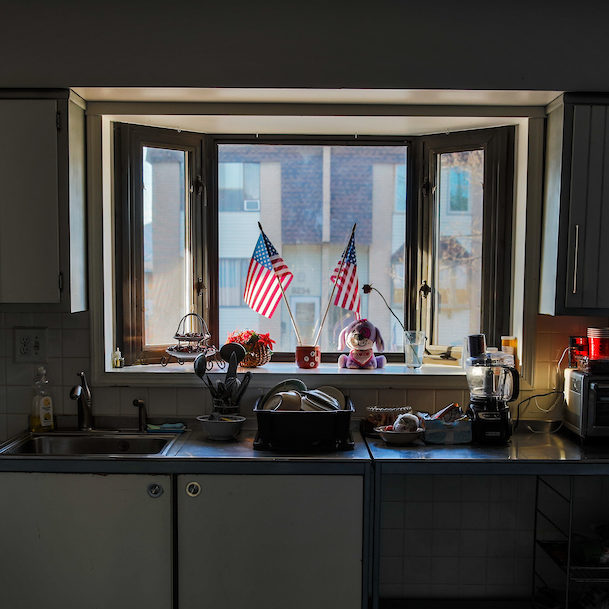 “Ahmad” & “Zainab”
“Ahmad” & “Zainab” 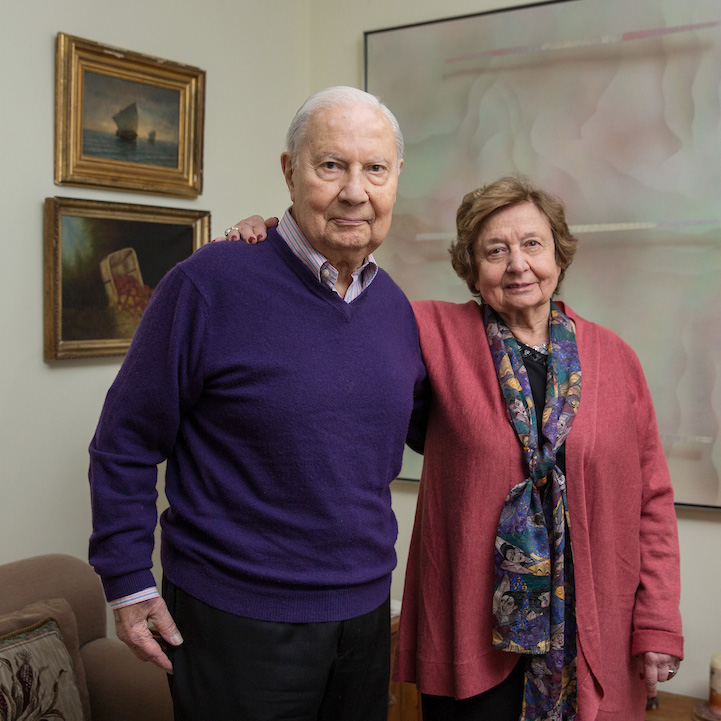 Jack and Gloris Dunnous
Jack and Gloris Dunnous  Maria Turcios
Maria Turcios 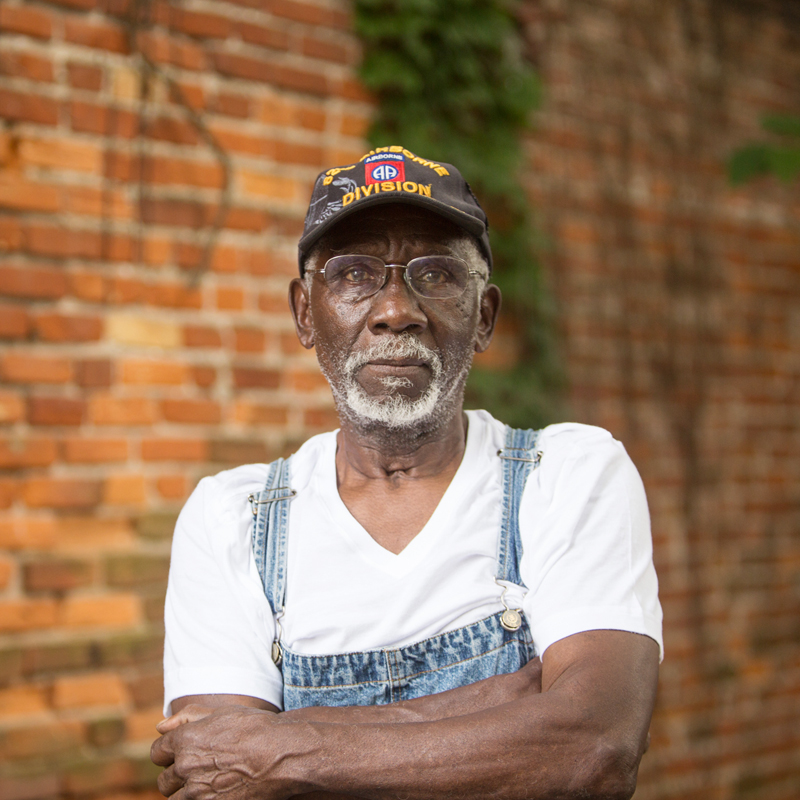 Lafayette El
Lafayette El 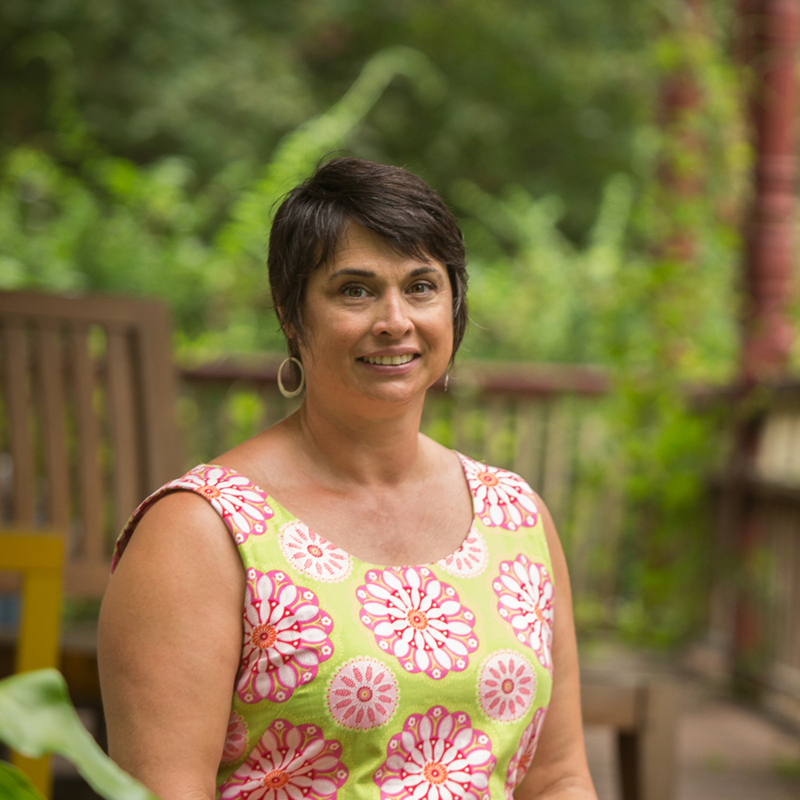 Tara O’Brien
Tara O’Brien  Sophia Simpson
Sophia Simpson